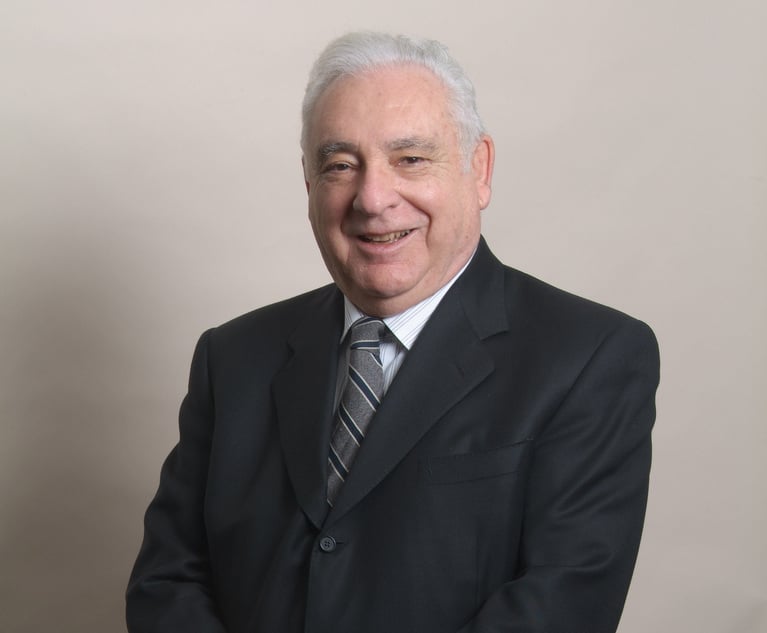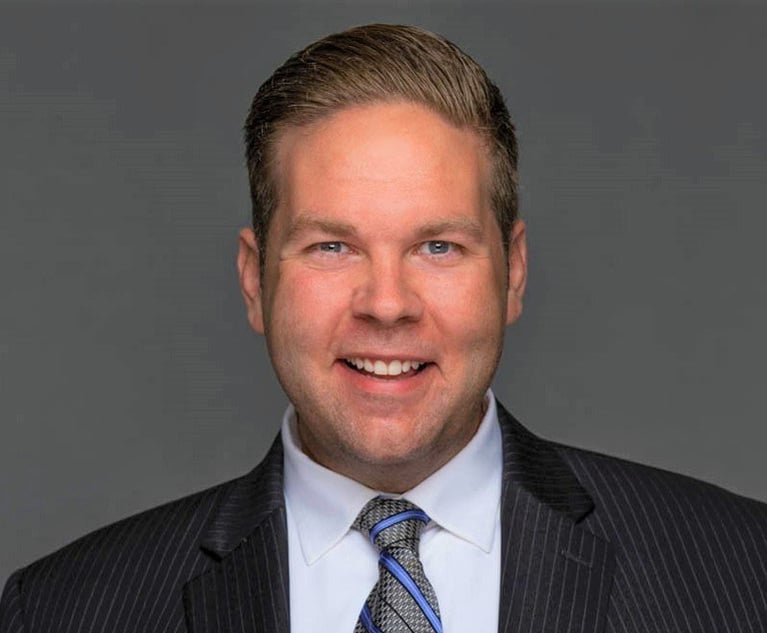 Credit: pathdoc/Shutterstock.com
Credit: pathdoc/Shutterstock.comAttorney Couple Who Pleaded Guilty to Tax Fraud Get Probation
Two Philadelphia lawyers who pleaded guilty to tax charges have been sentenced to terms of probation, to federal prosecutors' dismay.
April 05, 2019 at 12:35 PM
3 minute read
Two Philadelphia lawyers who pleaded guilty to tax charges have been sentenced to terms of probation, to federal prosecutors' dismay.
Edward Millstein and Susan Halpern, who are married, pleaded guilty to three counts of tax fraud in November. U.S. District Judge Cynthia Rufe of the Eastern District of Pennsylvania sentenced Millstein to six months' house arrest and five years' probation, while sentencing Halpern to five years' probation and a $5,000 fine. Prosecutors alleged that the money that should have gone to their six-figure tax debt was instead hidden and used to splurge on luxuries.
“We are disappointed in the sentences that were handed down,” U.S. Attorney William McSwain said in a statement. “These are serious crimes that clearly merit jail time, and the court's decision today sends the wrong message to the public.”
Millstein's attorney, William Brennan, said he and his client were appreciative of the court's sentencing.
“We're delighted with the sentence,” Brennan said. “It gives Mr. Millstein the opportunity to maintain his employment and thereby continue to have the ability to satisfy his obligation to the government. I think the court realized there's a lot more to Ted Millstein than this one unfortunate criminal case.”
Halpern's attorney, Jeffrey Miller of Nasuti & Miller, did not immediately respond to a request for comment.
The government alleged Millstein and Halpern owed $444,225 in taxes, for the calendar years 2007 through 2011. When the IRS tried to collect, Millstein hid money in his children's bank accounts to avoid levies. Prosecutors also claim that Millstein lied about obtaining a loan to pay the debt, and didn't tell investigators about a bank account he used to deposit the $300,000 salary paid by his firm each year from 2013 to 2015.
Halpern then spent tens of thousands of dollars on clothing, cosmetics, jewelry, salons, private clubs and trips abroad, while simultaneously failing to pay any of her and her husband's tax debt for 2010 and 2011, prosecutors said.
In November, McSwain chastised the defendants' behavior, saying he expected better from lawyers.
“These defendants intentionally failed to pay taxes, instead choosing to hide their money and spend it on luxuries that they could not afford,” McSwain said in a November statement. “The defendants are both attorneys—they know better. Instead of being law-abiding citizens, they chose to deliberately cheat the system and bankroll their lavish lifestyle. This office will continue to hold tax cheats accountable for their crimes.”
Millstein could have faced a maximum sentence of five years in prison, three years of supervised release and a $100,000 fine, while Halpern was susceptible to a maximum sentence of two years in prison, one year of supervised release and a $100,000 fine.
This content has been archived. It is available through our partners, LexisNexis® and Bloomberg Law.
To view this content, please continue to their sites.
Not a Lexis Subscriber?
Subscribe Now
Not a Bloomberg Law Subscriber?
Subscribe Now
NOT FOR REPRINT
© 2025 ALM Global, LLC, All Rights Reserved. Request academic re-use from www.copyright.com. All other uses, submit a request to [email protected]. For more information visit Asset & Logo Licensing.
You Might Like
View All
Samuel M. Lehrer, Retired Philadelphia Court of Common Pleas Judge, Dies
1 minute read

Longtime Reed Smith Health Care Partner Opts for Solo Practice Over Retirement
3 minute read
Trending Stories
- 1Restoring Trust in the Courts Starts in New York
- 2'Pull Back the Curtain': Ex-NFL Players Seek Discovery in Lawsuit Over League's Disability Plan
- 3Tensions Run High at Final Hearing Before Manhattan Congestion Pricing Takes Effect
- 4Improper Removal to Fed. Court Leads to $100K Bill for Blue Cross Blue Shield
- 5Michael Halpern, Beloved Key West Attorney, Dies at 72
Who Got The Work
Michael G. Bongiorno, Andrew Scott Dulberg and Elizabeth E. Driscoll from Wilmer Cutler Pickering Hale and Dorr have stepped in to represent Symbotic Inc., an A.I.-enabled technology platform that focuses on increasing supply chain efficiency, and other defendants in a pending shareholder derivative lawsuit. The case, filed Oct. 2 in Massachusetts District Court by the Brown Law Firm on behalf of Stephen Austen, accuses certain officers and directors of misleading investors in regard to Symbotic's potential for margin growth by failing to disclose that the company was not equipped to timely deploy its systems or manage expenses through project delays. The case, assigned to U.S. District Judge Nathaniel M. Gorton, is 1:24-cv-12522, Austen v. Cohen et al.
Who Got The Work
Edmund Polubinski and Marie Killmond of Davis Polk & Wardwell have entered appearances for data platform software development company MongoDB and other defendants in a pending shareholder derivative lawsuit. The action, filed Oct. 7 in New York Southern District Court by the Brown Law Firm, accuses the company's directors and/or officers of falsely expressing confidence in the company’s restructuring of its sales incentive plan and downplaying the severity of decreases in its upfront commitments. The case is 1:24-cv-07594, Roy v. Ittycheria et al.
Who Got The Work
Amy O. Bruchs and Kurt F. Ellison of Michael Best & Friedrich have entered appearances for Epic Systems Corp. in a pending employment discrimination lawsuit. The suit was filed Sept. 7 in Wisconsin Western District Court by Levine Eisberner LLC and Siri & Glimstad on behalf of a project manager who claims that he was wrongfully terminated after applying for a religious exemption to the defendant's COVID-19 vaccine mandate. The case, assigned to U.S. Magistrate Judge Anita Marie Boor, is 3:24-cv-00630, Secker, Nathan v. Epic Systems Corporation.
Who Got The Work
David X. Sullivan, Thomas J. Finn and Gregory A. Hall from McCarter & English have entered appearances for Sunrun Installation Services in a pending civil rights lawsuit. The complaint was filed Sept. 4 in Connecticut District Court by attorney Robert M. Berke on behalf of former employee George Edward Steins, who was arrested and charged with employing an unregistered home improvement salesperson. The complaint alleges that had Sunrun informed the Connecticut Department of Consumer Protection that the plaintiff's employment had ended in 2017 and that he no longer held Sunrun's home improvement contractor license, he would not have been hit with charges, which were dismissed in May 2024. The case, assigned to U.S. District Judge Jeffrey A. Meyer, is 3:24-cv-01423, Steins v. Sunrun, Inc. et al.
Who Got The Work
Greenberg Traurig shareholder Joshua L. Raskin has entered an appearance for boohoo.com UK Ltd. in a pending patent infringement lawsuit. The suit, filed Sept. 3 in Texas Eastern District Court by Rozier Hardt McDonough on behalf of Alto Dynamics, asserts five patents related to an online shopping platform. The case, assigned to U.S. District Judge Rodney Gilstrap, is 2:24-cv-00719, Alto Dynamics, LLC v. boohoo.com UK Limited.
Featured Firms
Law Offices of Gary Martin Hays & Associates, P.C.
(470) 294-1674
Law Offices of Mark E. Salomone
(857) 444-6468
Smith & Hassler
(713) 739-1250





